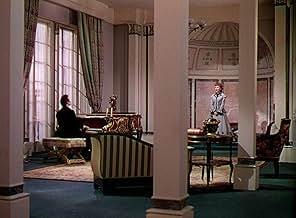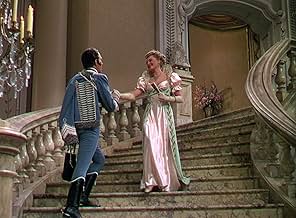VALUTAZIONE IMDb
6,4/10
8622
LA TUA VALUTAZIONE
Aggiungi una trama nella tua linguaAn acid-scarred composer rises from the Paris sewers to boost his favorite opera understudy's career.An acid-scarred composer rises from the Paris sewers to boost his favorite opera understudy's career.An acid-scarred composer rises from the Paris sewers to boost his favorite opera understudy's career.
- Vincitore di 2 Oscar
- 3 vittorie e 5 candidature totali
Kate Drain Lawson
- Landlady
- (as Kate Lawson)
Trama
Lo sapevi?
- QuizThe original script revealed Claudin to be Christine's father, who abandoned her and her mother in order to pursue a musical career. When this was excised from the final film, it left Claudin's obsession with Christine unexplained.
- BlooperWhen Christine takes the mask off from Phantom's face, we see that his scar reaches the low area of his right cheek, even the right eyelid is slightly fallen. But before that during the entire film, we never see a single mark of the scar on the uncovered area of the Phantom's face, not even the fallen eyelid through the mask.
- Citazioni
[Christine has left Raoul and Anatole in her dressing room while she greets a crowd of admirers]
Raoul D'Aubert: Would you join me for a bit of supper at the Cafe de l'Opera?
Anatole Garron: With pleasure, monsieur.
Raoul D'Aubert: Think we can get through this crowd?
Anatole Garron: Certainly. After all, who'd pay any attention to a baritone and a detective?
- ConnessioniFeatured in Weirdo with Wadman: Phantom of the Opera (1964)
- Colonne sonoreLULLABY OF THE BELLS
(uncredited)
Written by Edward Ward
Lyrics George Waggner
Sung by Susanna Foster and Nelson Eddy
Recensione in evidenza
Poor old Enrique Claudin doesn't have much luck – and what he does have is all bad. An adept but unremarkable violinist with the Paris Opera House, he secretly worships Christine Dubois, the young understudy to the snooty leading songstress, and even goes so far as to anonymously spend all his money on singing lessons for her even though she is barely conscious of his existence. Enrique loses his job when he starts losing the feeling in his fingers. Then he mistakenly believes the musical manuscript he has been working on has been stolen by no less a light than Franz Liszt (Lord only knows how he wandered into this). Gripped by a violent rage, Enrique throttles the bad-tempered music publisher who prevents him from retrieving his manuscript and ends up with a face full of acid courtesy of the publisher's panicky secretary. Evading capture by the police, Enrique hides in the sewers beneath the Opera House and, like a tomato that's rolled under the cooker, grows dark and warped in the darkness.
Gaston Laroux's Phantom of the Opera is one of those stories that filmmakers feel compelled to retell every couple of years, so there's not a great deal to set this apart from all those other versions. Universal's use of colour is uncharacteristically sumptuous, and given that this tale falls nominally into the horror category for which they were famed, it stands by comparison to their other output of the time as something of a prestige production. There's not really much horror to speak of – although, by modern standards, none of the 40s horror films are likely to scare anyone over the age of five, so it's not out of the ordinary there. In fact it would arguably be more accurate to describe it as a musical given the amount of time that's given over to opera numbers that do little other than pause the action.
Claude Rains gives a typically polished performance as the tormented Claudin, although the failure of the script to get under his character's (scorched) skin once he assumes the identity of the Phantom leaves the actor with little to work with once he dons the mask and descends into B-movie madness. Nobody else in the cast really stands out. Susanna Foster makes a rather unmemorable ingénue (who shows worrying indications of following the same path as the prima donna she replaces given the way some of their lines are nearly identical), and leaves you wondering why poor old Claudin got so hot and bothered over her in the first place. Nelson Eddy and Edgar Barrier provide some light relief as the troupe's baritone and the investigating police officer, both of whom also fall under Miss Foster's mysterious spell.
Phantom of the Opera provides a good example of 40s Hollywood expertise (although it looks more like an MGM film than a Universal), and is entertaining enough even though it rarely provides anything that's likely to stick in the mind. Arthur Lubin at least attempts moments of artistry – for example by having the camera repeatedly passing sources of light – candelabras, chandeliers, etc – to suggest the fatal fascination Claudin's object of unrequited love holds for him.
Gaston Laroux's Phantom of the Opera is one of those stories that filmmakers feel compelled to retell every couple of years, so there's not a great deal to set this apart from all those other versions. Universal's use of colour is uncharacteristically sumptuous, and given that this tale falls nominally into the horror category for which they were famed, it stands by comparison to their other output of the time as something of a prestige production. There's not really much horror to speak of – although, by modern standards, none of the 40s horror films are likely to scare anyone over the age of five, so it's not out of the ordinary there. In fact it would arguably be more accurate to describe it as a musical given the amount of time that's given over to opera numbers that do little other than pause the action.
Claude Rains gives a typically polished performance as the tormented Claudin, although the failure of the script to get under his character's (scorched) skin once he assumes the identity of the Phantom leaves the actor with little to work with once he dons the mask and descends into B-movie madness. Nobody else in the cast really stands out. Susanna Foster makes a rather unmemorable ingénue (who shows worrying indications of following the same path as the prima donna she replaces given the way some of their lines are nearly identical), and leaves you wondering why poor old Claudin got so hot and bothered over her in the first place. Nelson Eddy and Edgar Barrier provide some light relief as the troupe's baritone and the investigating police officer, both of whom also fall under Miss Foster's mysterious spell.
Phantom of the Opera provides a good example of 40s Hollywood expertise (although it looks more like an MGM film than a Universal), and is entertaining enough even though it rarely provides anything that's likely to stick in the mind. Arthur Lubin at least attempts moments of artistry – for example by having the camera repeatedly passing sources of light – candelabras, chandeliers, etc – to suggest the fatal fascination Claudin's object of unrequited love holds for him.
- JoeytheBrit
- 19 lug 2011
- Permalink
I più visti
Accedi per valutare e creare un elenco di titoli salvati per ottenere consigli personalizzati
- How long is Phantom of the Opera?Powered by Alexa
Dettagli
- Data di uscita
- Paese di origine
- Lingua
- Celebre anche come
- Phantom of the Opera
- Luoghi delle riprese
- Azienda produttrice
- Vedi altri crediti dell’azienda su IMDbPro
Botteghino
- Budget
- 1.500.000 USD (previsto)
- Tempo di esecuzione1 ora 32 minuti
- Mix di suoni
- Proporzioni
- 1.37 : 1
Contribuisci a questa pagina
Suggerisci una modifica o aggiungi i contenuti mancanti

Divario superiore
By what name was Il fantasma dell'opera (1943) officially released in India in English?
Rispondi





































